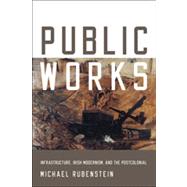Public Works
, by Rubenstein, Michael- ISBN: 9780268040307 | 0268040303
- Cover: Paperback
- Copyright: 10/15/2010
In Public Works: Infrastructure, Irish Modernism, and the Postcolonial, Michael Rubenstein documents the relationship between Irish modernism and a restricted segment of the material culture of the modern state known colloquially as "public utilities" or "water, gas, and electricity." The water tap, the toilet, the gas jet, and the electrical light switch: these are all sites, in Irish modernism, of unexpected literary and linguistic intensities that burst through the routines of everyday life, defamiliarizing and reconceptualizing that which we might not normally consider worthy of literary attention. Such public utilities--material networks of power and provision, submission and entitlement--are taken up in Irish modernism not only as a nexus of anxieties about modern life, but also as a focal point for the hopes held out for the postcolonial Irish Free State. Public utilities figure a normative and utopian standard of modernity and modernization; they embody in Irish modernism and in other postcolonial literatures an ideal for the postcolonial state; and they figure a continuity between the material networks of the modern state and the abstract ideals of revolutionary republicanism (liberty, equality, and brotherhood). They define a new territory of contestation within the discourses of civil and human rights. Moreover, public utilities influence the formal qualities of both Irish modernist and postcolonial literature. In analyses of literary works by James Joyce, Flann O''Brien, Elizabeth Bowen, Denis Johnston, Samuel Beckett, and Patrick Chamoiseau, Rubenstein asks us to think about the industrial networks of the twentieth century alongside self-consciously "national" literary works and to understand them as different but inherently related forms of public works. In doing so his book maps thematic and formal relationships between national infrastructure and national literature, revealing an intimate dialogue between the nation''s literary arts and the state''s engineering cultures. " Public Works, Michael Rubenstein''s pathbreaking book, brilliantly explores relationships between modern ''engineering cultures'' and literary cultures. Juxtaposing literary texts and electric power generators, plays and water schemes, he offers us nothing less than a new way to read literary modernism''s engagement with the real. His book represents a major intervention in postcolonial studies, uncovering new and pragmatic models of imagined community after colonialism. Additionally, Rubenstein''s work marks a significant move in contemporary Irish studies by developing paradigms that help us read Ireland''s postcolonial statehood in a global context. It also offers highly original readings of a series of Irish late-modernist writers, all in a timely and truly interdisciplinary project, beautifully done." -- Enda Duffy, University of California, Santa Barbara ". . . one of the most original and important contributions to Irish studies, and to a number of other fields as well, that has been written by a young scholar in recent years. It will be an important and much discussed book. It participates in, and outlines the future of, significant new directions in areas such as Irish studies, modernist studies, postcolonial studies, and the study of the relations among technology, materiality, and culture." -- Marjorie Howes, Boston College "Can you imagine a Joycean appeal for the payment of taxes? If you do not find it easy, you may be ready to take in the superb literary flair and pitch-perfect sense of present urgencies that puts Public Worksat the sharpest edge of new scholarship. Michael Rubenstein makes a tiger''s leap into the recent past, when the intimacy of the home had not yet learned to take for granted its connection to networks of electricity, gas, and water. He has written thebook on the very hot topic of infrastructure, and he''s done so while also figuring out a new direction for postcolonial studies. You will never be able to read Ulyssesthe same way again." -- Bruce Robbins, Columbia University







